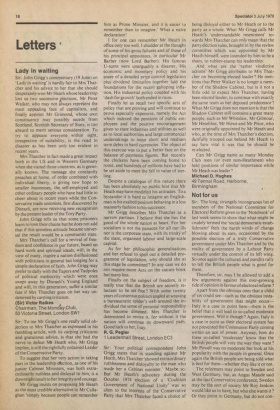Sir: Your political correspondent John Grigg states that in standing
against Mr Heath, Mrs Thatcher 'showed extraordinary ruthlessness and disloyalty to the man who made her a Cabinet minister.' Maybe so. But Mr Heath's advocacy during the October 1974 election of a 'Coalition Government of National Unity' was so alien to the interests of the Conservative Party that Mrs Thatcher faced a choice of being disloyal either to Mr Heath or to the party as a whole. What Mr Grigg calls Mr Heath's 'understandable resentment' towards Mrs Thatcher can only mean that the partyelection rules, brought in by the review committee which was appointed by Mr Heath himself, were intended by him to be a sham, to rubber-stamp his leadership.
And what are the 'rather vindictive actions' Mr Grigg attributes to Mrs Thatcher on becoming elected leader? He mentions that Peter Walker is no longer a member of the Shadow Cabinet, but is it not a little odd to expect Mrs Thatcher, having been elected leader, to continue with exactly the same team as her deposed predecessor ? What Mr Grigg does not mention is that the Shadow Cabinet still contains a great many people, such as Mr Whitelaw, Mr Gilmour, Mr Heseltine, Mr Howe and Mr Prior, who were originally appointed by Mr Heath and who, at the time of Mrs Thatcher's election, dutifully trooped out behind Mr Heath to say how vital it was that he should be re-elected.
Can Mr Grigg name as many Monday Club men (or even non-Heathmen) who held positions of similar importance while Mr Heath was leader ?
Michael D. Hughes 49 Tennal Road, Harborne, Birmingham


































 Previous page
Previous page